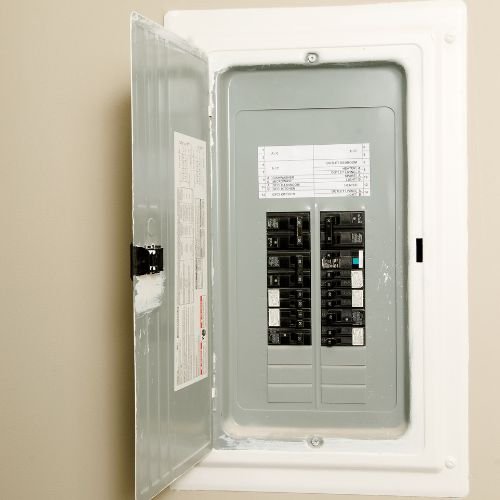Everything a Homeowner Needs to Know About Fuse Panels and Their Upgrades
Understanding fuse panels' basics, limitations, and the benefits of upgrading can help homeowners make decisions about their electrical systems.
Fuse panels, once a common feature in homes nationwide, are now considered outdated and potentially hazardous. As homeowners become more aware of electrical safety and the increasing power demands of modern appliances, many are considering upgrading their fuse panels to circuit breaker panels. Understanding fuse panels' basics, limitations, and the benefits of upgrading can help homeowners make decisions about their electrical systems.
What is a Fuse Panel?
Also known as a fuse box, a fuse panel is an electrical distribution system that uses fuses to protect a home's electrical circuits from overload. Each fuse contains a metal strip that melts when too much current flows through it, interrupting the circuit and preventing damage or fire. While effective, fuses have several drawbacks compared to modern circuit breakers.
Limitations of Fuse Panels
Capacity Issues: Most fuse panels were designed for homes with lower electrical demands. They may not provide enough power for modern appliances and electronics.
Inconvenience: When a fuse blows, it must be replaced, which can be inconvenient, especially if it happens frequently or at night.
Safety Concerns: Homeowners may be tempted to use higher-amperage fuses than recommended, creating fire hazards.
Insurance Issues: Some insurance companies may charge higher premiums or refuse coverage for homes with outdated fuse panels.
Lack of Advanced Safety Features: Fuse panels lack modern safety features like ground fault circuit interrupters (GFCIs) and arc fault circuit interrupters (AFCIs).
Signs a Fuse Panel Needs Upgrading
Several indicators suggest it's time to consider upgrading a fuse panel:
Frequent Blown Fuses: If fuses blow regularly, it may indicate the panel can't handle the home's electrical load.
Flickering or Dimming Lights: This can signal voltage fluctuations due to an overloaded system.
Warm or Discolored Fuses or Panel: These symptoms may indicate overheating, which is a serious safety hazard.
Home Renovations or Major Appliance Additions: These changes often increase electrical demands beyond what an old fuse panel can handle.
Age of the Panel: Fuse panels over 30-40 years old are prime candidates for replacement, even if they seem to be working fine.
Benefits of Upgrading to a Circuit Breaker Panel
There are numerous advantages to upgrading from a fuse panel to a circuit breaker panel, including:
Increased Capacity: Circuit breaker panels can handle higher electrical loads, accommodating modern appliances and electronics.
Convenience: When a circuit breaker trips, it can be reset easily without replacement.
Enhanced Safety: Circuit breakers are less likely to be tampered with and include advanced safety features like GFCIs and AFCIs.
Improved Home Value: An updated electrical system can increase a home's value and appeal to potential buyers.
Lower Insurance Premiums: Many insurance companies offer homes with modern electrical systems lower rates.
Future-Proofing: A new panel can accommodate future electrical needs and smart home technologies.
Costs and Considerations
The cost of upgrading from a fuse panel to a circuit breaker panel can vary widely depending on factors such as:
Home size and electrical needs
Local labor rates
Extent of rewiring required
Additional upgrades (e.g., adding new circuits or outlets)
Athough the upfront cost may seem high, the long-term benefits, such as safety, convenience, and potential energy savings, often outweigh the initial investment.
Choosing a Licensed Electrician
Selecting a qualified, licensed electrician is crucial for a safe and compliant panel upgrade. Homeowners should:
Verify the electrician's license and insurance
Ask for references and check reviews
Obtain multiple quotes for comparison
Discuss the upgrade process and timeline in detail
A reputable electrician will happily answer questions and provide a detailed estimate for the work.
Additional Electrical Upgrades to Consider
While upgrading the fuse panel, homeowners may want to consider other electrical improvements:
Adding new circuits for high-demand areas
Installing GFCI outlets in kitchens, bathrooms, and outdoor areas
Upgrading to AFCI protection for bedrooms and living areas
Improving grounding and bonding for enhanced safety
These additional upgrades can further improve the home's electrical safety and functionality.
Maintaining the New Circuit Breaker Panel
After upgrading to a circuit breaker panel, proper maintenance is essential:
Schedule regular inspections by a licensed electrician
Keep the panel clean and free from dust and debris
Avoid overloading circuits
Familiarize household members with the panel's operation and safety features
Regular maintenance guarantees the longevity and safe operation of the new electrical system.
Upgrading from a fuse panel to a circuit breaker panel is a significant home improvement that enhances safety, convenience, and electrical capacity. While it represents a substantial investment, the benefits of modernizing a home's electrical system are numerous and long-lasting.

